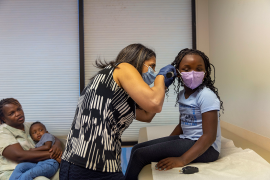Medscape General Medicine (MedGenMed, www.medscape.com/journal/MedGenMed), the online peer-reviewed general medical journal, plans to publish a new study today of more than 4,000 Americans ages 18 to 64 which shatters the notion that health insurance will provide protection against financial risk and assure that individuals can get healthcare services when they are sick. Particularly at risk are Americans with low incomes. According to the study, "Inadequate Health Insurance: Costs and Consequences," authored by researchers from the Harvard University School of Public Health and the Commonwealth Fund, nearly one in five insured adults said there was a time in the past year when they did not have enough money to pay for medical bills, prescription drugs, or other healthcare costs, and 16% reporting that they had been contacted by a collection agency about medical bills. Approximately one in 10 insured adults said they did not get needed care, and similar proportions reported that they went without each of these three services due to costs: 1) They did not see a doctor when sick; 2) they did not fill a prescription; or 3) they did not follow up on a recommended treatment or diagnostic test because of cost. "With the Presidential campaign heightening the national debate over healthcare, this research is particularly relevant in that it shatters the notion of two populations in the U.S. - the insured and the uninsured," said Karen Donelan, ScD, of the Department of Health Policy and Management at the Harvard School of Public Health, who is the lead author of the study as well as a member of the Editorial Board of MedGenMed's parent site, medscape.com. "Instead, a continuum of health insurance coverage is emerging as changes in the healthcare marketplace occur. The most essential notion of insurance is that it will provide protection against financial risk and an assurance that we can get health care services when we are sick," Dr. Donelan added. "We need to pay far more attention to assuring the adequacy of health insurance coverage, especially for low-wage working families," said Cathy Schoen, MS, vice president of research and evaluation at the Commonwealth Fund, which supported the study. The Commonwealth Fund is a private foundation that supports independent research on health and social issues and makes grants to improve health care practice and policy. The third author of the article is Catherine M. DesRoches, DrPH, also of the Department of Health Policy and Management at the Harvard School of Public Health. The study uses data from the Commonwealth Fund 1999 Survey of Workers' Health Insurance to analyze the cost and access problems of insured adults by a number of different variables, including income, plan satisfaction, health status and insurance stability. Responses of three lower income groups (under $20,000, $20-$35,000, and $35,000-$60,000) were compared to a group with family incomes of over $60,000. Following are some of the other key findings:
- One of every seven respondents said there had been a time when they did not have enough money to pay their rent or mortgage; a similar proportion said there had been a time they could not pay electric or heating bills; and 11% recalled a time when they did not have enough money to buy food.
- Insured adults with incomes under $20,000 were nine times more likely to state that they were unable to pay medical bills within the past year that those with incomes over $60,000, and were three times as likely to make that statement than insured individuals with incomes between $35,000 and $60,000.
- One-fourth of the lowest income group (less than $20,000) said that they did not visit a doctor when sick or have a prescription filled because of cost. And 11 percent of this insured segment reported not being able to buy food at some point over the past year.
(MedGenMed, www.medscape.com/journal/MedGenMed), published on the leading professional medical information site, medscape.com, is the first and only online, peer-reviewed, primary source general medical journal. It follows editorial guidelines established more than 20 years ago as the Vancouver Principles and now used by hundreds of medical journals worldwide. George D. Lundberg, MD, Editor-in-Chief of MedGenMed, was a member of the Vancouver Group, a select body of general medical journal editors advocating the use of rigorous editorial principles and requirements for manuscripts submitted to peer-review medical journals. Articles selected by MedGenMed are peer-reviewed, edited and then published exclusively online free of charge. Those articles become available to a virtually unlimited, broad-based audience of physicians, other healthcare professionals, patients, consumers, policymakers and the news media. Because the Internet does not limit MedGenMed to a set weekly, monthly or quarterly publishing schedule, medscape.com maximizes the speed of delivery by reducing lengthy print cycles while upholding the highest standards of quality. Medscape.com is owned and operated by MedicaLogic/Medscape, Inc. ABOUT MEDICALOGIC/MEDSCAPE, INC.
MedicaLogic/Medscape, Inc. (NASDAQ: MDLI), focuses on the timely delivery of clinical data and up-to-date knowledge to healthcare professionals and consumers, saving time, money, and lives. The company integrates the broad reach of its authoritative Web sites - medscape.com and cbs.healthwatch.com -- with the depth of its clinical applications for online medical records. These online medical records are the digital hub for Internet and wireless connection of healthcare professionals, consumers, and other healthcare stakeholders. As of June 30, 2000, more than 13 million patients' records had been created using these applications. As of that date, medscape.com and cbs.healthwatch.com had more than 2.4 million registered members worldwide, including over 440,000 registered as physicians, 1.2 million as allied health professionals and more than 850,000 as consumers. For company information, please visit information.medicalogic.com. MedicaLogic, Medscape, and Logician are registered trademarks of MedicaLogic/Medscape, Inc. in the United States. AboutMyHealth and other MedicaLogic/Medscape logos, product names, and service names are also trademarks of MedicaLogic/Medscape, Inc., which may be registered in other countries. Other product and brand names are trademarks of their respective owners. CBS and the CBS eye device are registered trademarks of CBS Broadcasting, Inc.


